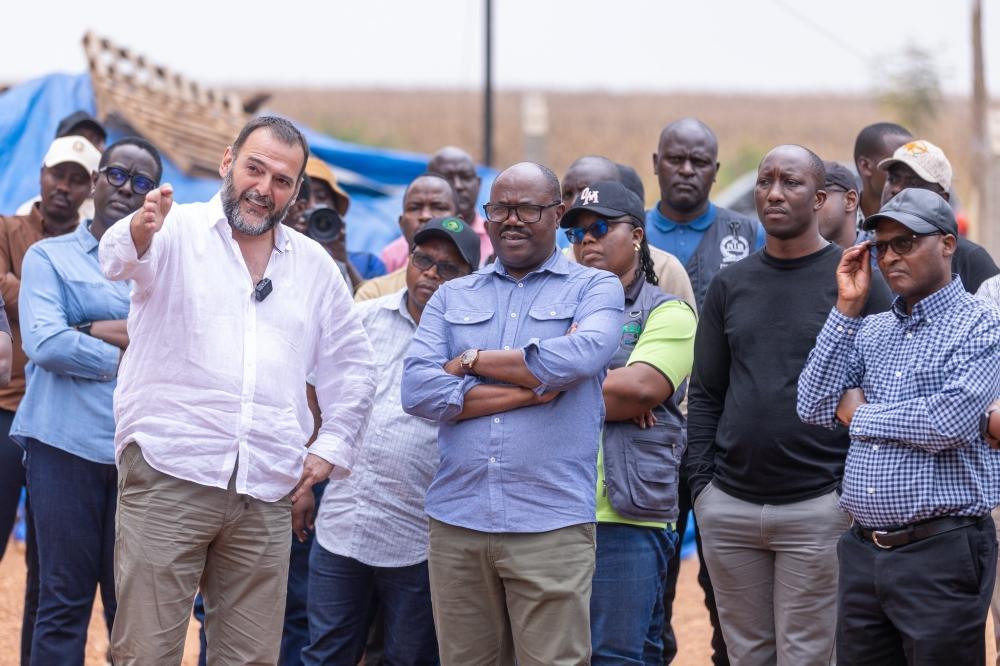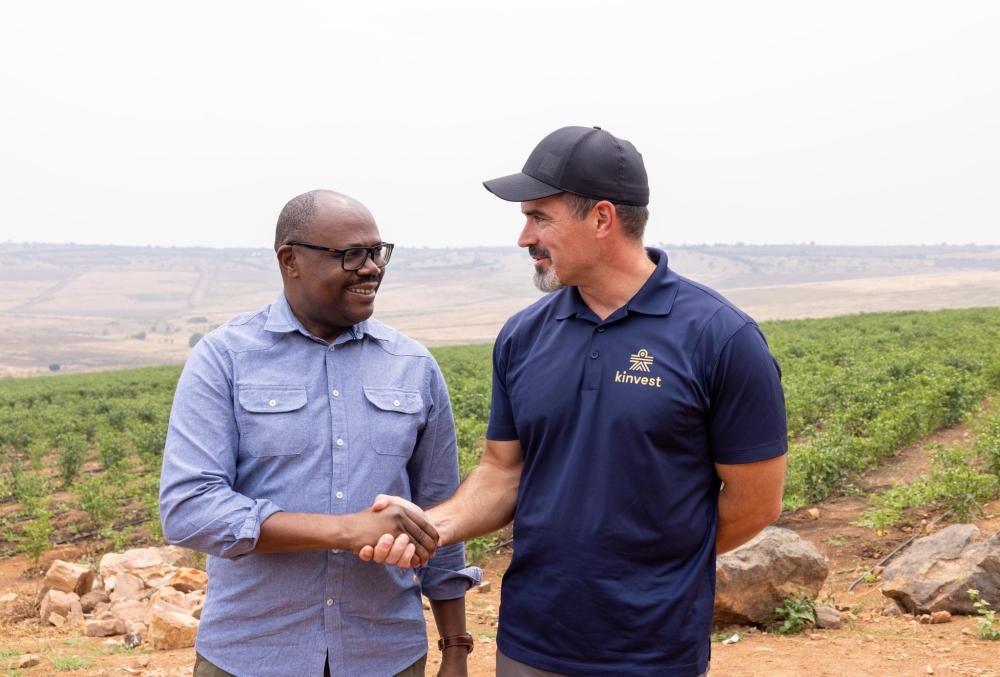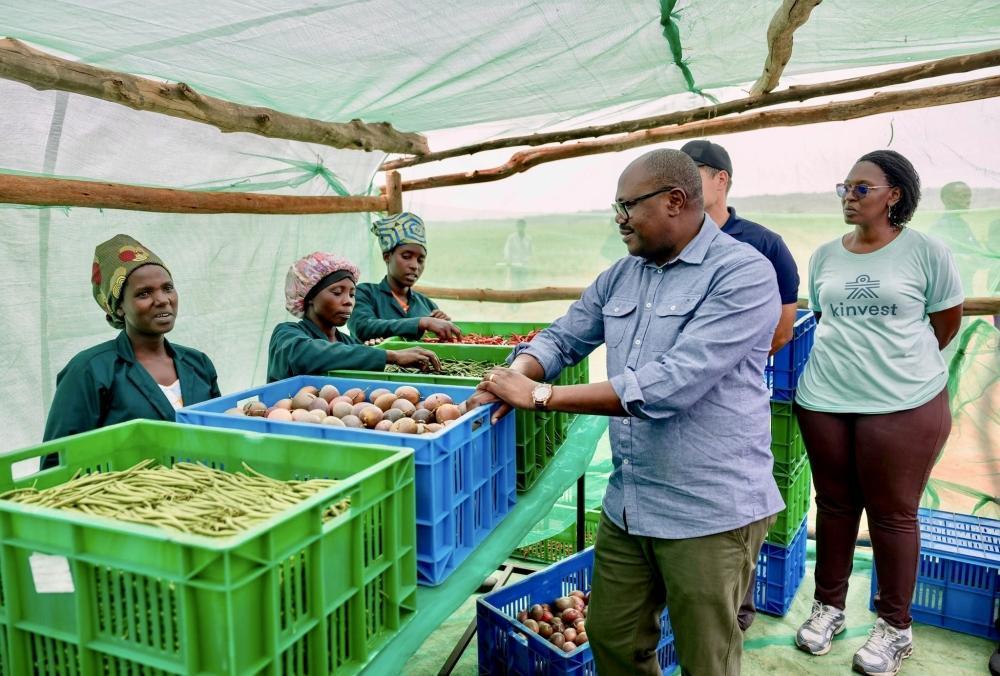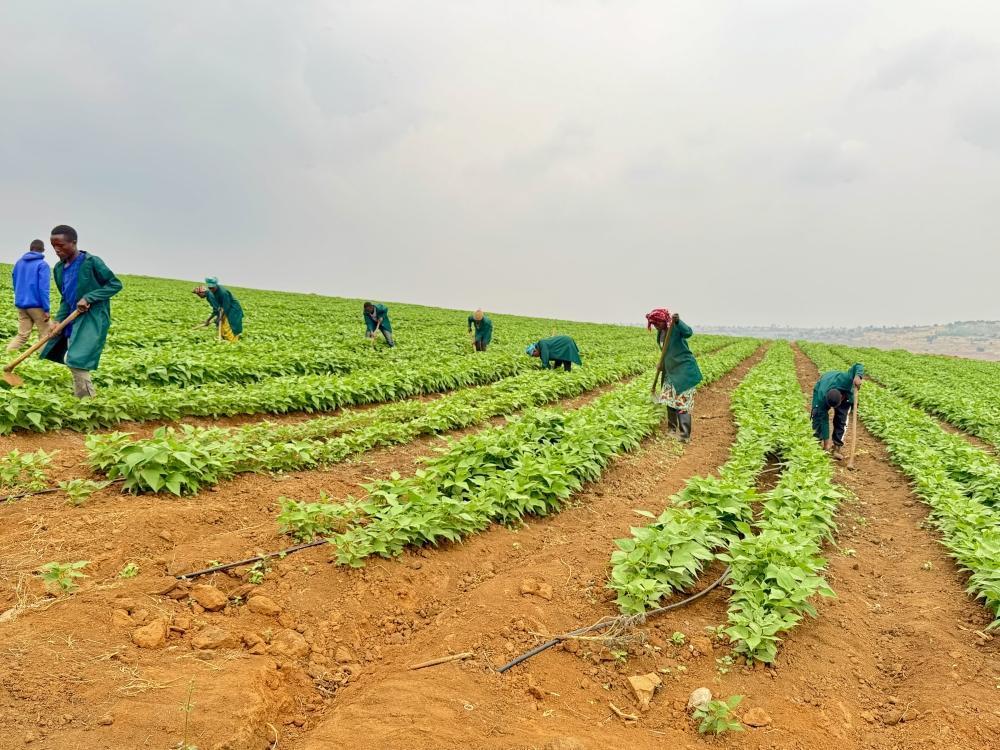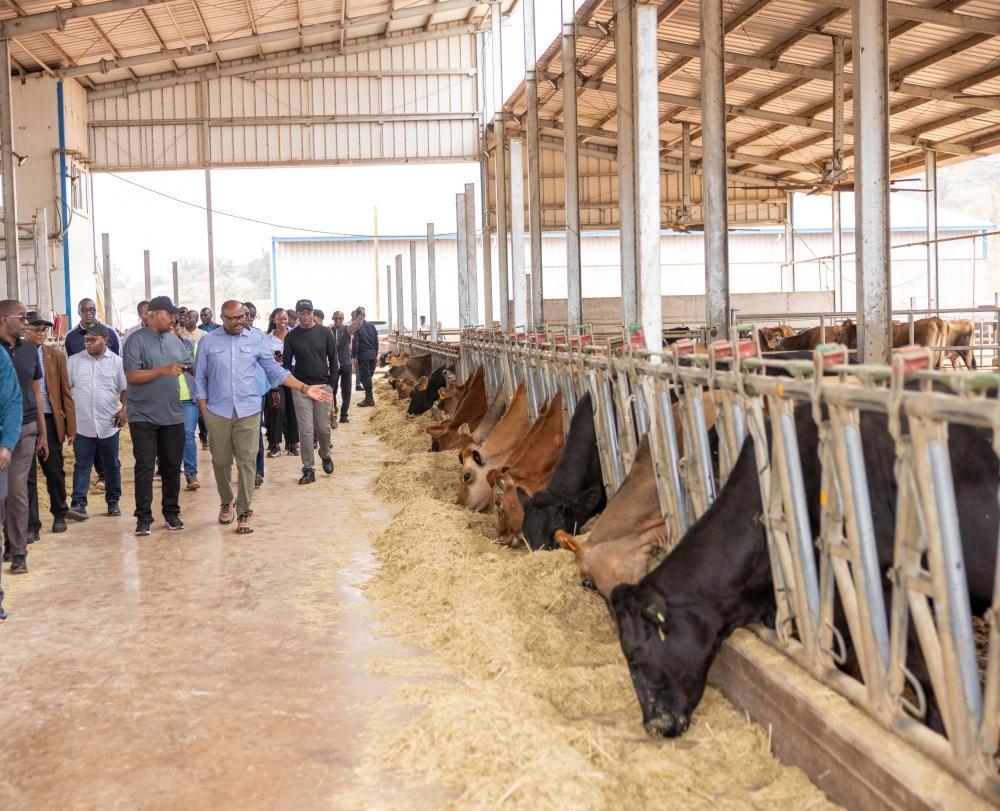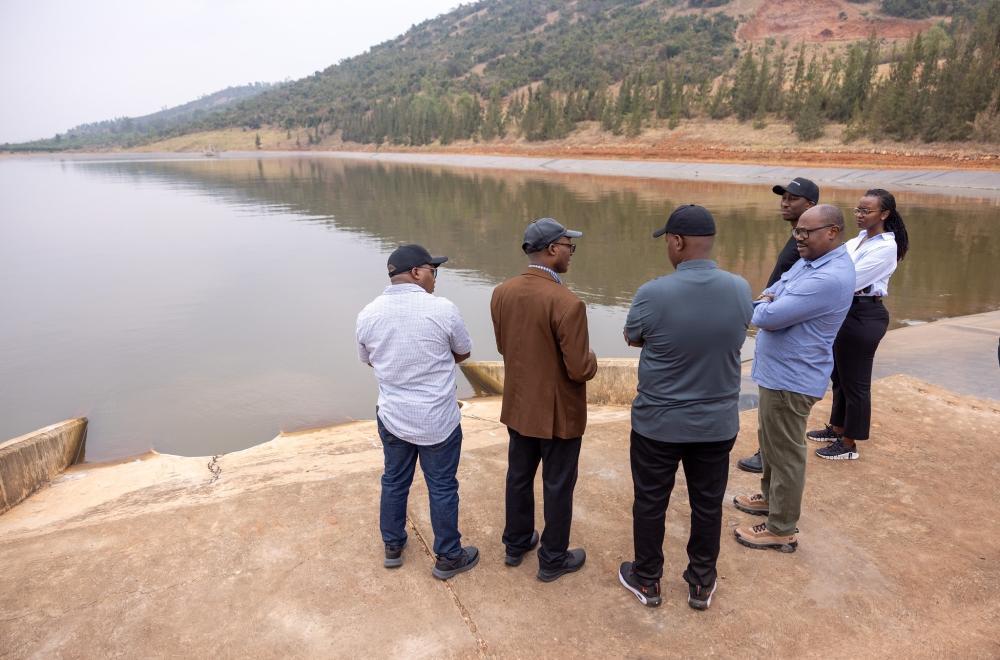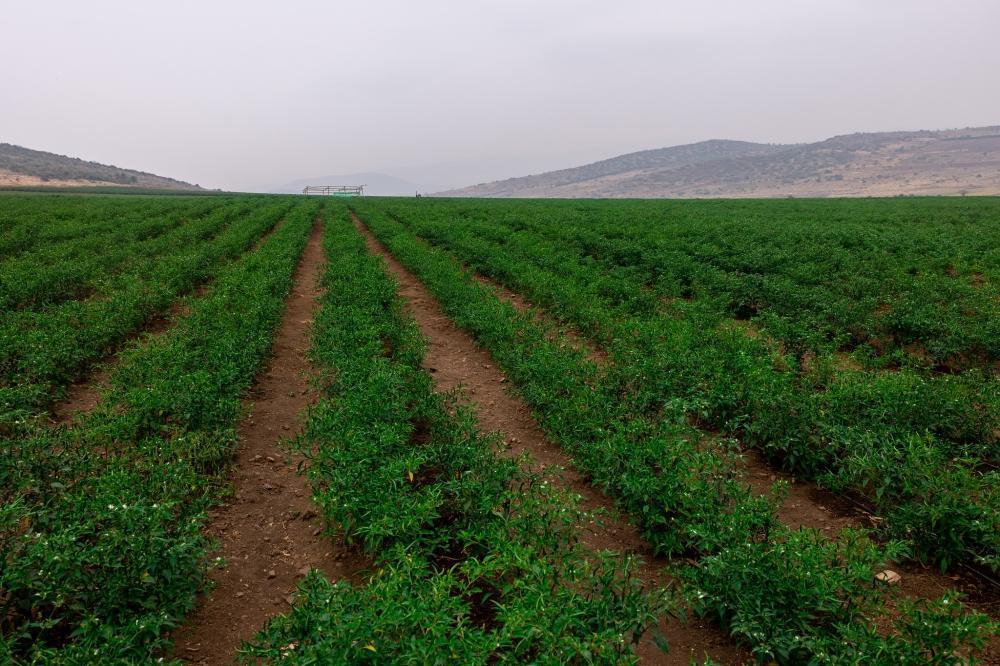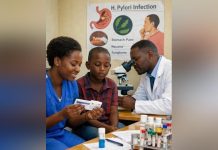Africa-Press – Rwanda. In Nyagatare District, Eastern Province, Rwanda, some swathes of land once parched by persistent drought are now flourishing with maize and high-value crops, including French beans, chilli and passion fruits, thanks to Gabiro Agribusiness Hub (GAH).
This is a transformative irrigation-led farming project that is turning arid land into a productive agricultural powerhouse.
The project serves as the first large-scale and job-creating farming model expected to drive up agriculture and generate income in Rwanda and would later be expanded to other parts of the country, according to its implementers.
Water used to irrigate crops at the hub is pumped from River Akagera through dedicated stations. It is taken to a water dam or operational reservoir with 120,000 m3 capacity, built at a relatively elevated level and then channeled – by gravity flow – to farms through a concrete open canal and pipe system.
At one farm there, one can see a vast plantation of ready-to harvest maize – covering 300 hectares – managed by EA Agro, implying both the promise of food security and the rising confidence of investors in Rwanda’s agriculture sector, according to actors in the industry.
Prime Minister Justin Nsengiyumva shakes hands with Jesse Ratichek, Kinvest Managing Partner, at one of the company’s farms in Gabiro Agribusiness Hub, on August 9, 2025 (courtesy)
Chandra Trifonov, EA Agro’s CEO told The New Times that this season, the firm will harvest about eight tonnes per ha – implying about 2,400 tonnes on the 300 hectares – and targets to increase the yield up to 12 tonnes per ha in the upcoming seasons.
On August 9, Prime Minister Justin Nsengiyumva toured the expansive site as the first phase of the GAH project nears completion.
The initial phase of the hub spans 5,600 hectares, already equipped with irrigation infrastructure. The government has invested $118 million (approximately Rwf170 billion) in developing the initiative, Aloysius Ngarambe, CEO of Gabiro Agribusiness Hub Ltd, the company managing the project, told The New Times.
The Ministry of Agriculture and Animal Resources says the hub is expected to reduce trade imbalances, boost food production, and create thousands of jobs.
Land within the hub is leased to investors at $375 per hectare per year, with a modest 2 per cent annual increment from the third year, according to the hub’s 2022 leasing guidelines. The investment model aims to encourage commercial farming while ensuring land accessibility for agribusiness players.
Drip irrigation is a focus at the hub, as a technology that ensures efficient water use for crop yield.
Ngarambe said the first phase of the project is 98 per cent complete.
“We are ready for commissioning. Netafim, the Israeli firm overseeing the development, is expected to officially hand over the project in September,” he said.
An attraction for foreign investment, creating impact
Already, the hub has attracted seven agribusiness investors (firms) across key value chains like maize, soybeans, and horticulture.
Responding to a question on the total investment by the seven investors at the hub, Ngarambe said that an evaluation is underway to determine how much they have spent so far compared to the investment plans they submitted when applying for land at the facility.
Over 6,000 jobs have been created, and more are expected as production ramps up. The second phase will expand cultivated land by an additional 10,000 hectares—bringing the total to 15,600 hectares. This expansion will make the project cover some parts of Nyagatare and Gatsibo, both districts in Rwanda’s Eastern Province.
Among the investors is Kinvest, a firm growing high-value export crops, such as French beans, passion fruit (Ester variety), chili, and Hass avocado. It was allocated 500 hectares.
It employs 60 permanent staff and 600 casual labourers, which sometimes can reach 800 depending on activities at its farms in Gabiro Agribusiness Hub, according to its management.
In 2024, the Ministry of Agriculture and Animal Resources indicated that Kinvest was expected to invest more than Rwf18.8 billion in five years in agribusiness at the hub.
Kinvest Managing Partner, Jesse Ratichek, who is from the US, said that by December, the firm expects to employ around 1,000 workers and produce 500 to 550 tonnes monthly.
Christine Niyikiza, a Nyagatare resident and employee at Kinvest, said the job has brought her relief, enabling her to save part of her salary for family well-being.
“I used to worry about my children’s education because I could not afford school fees,” she said, adding that her earnings now allow her to cover their academic expenses.
“This job is improving our living conditions and those of our families,” she added.
Ratichek indicated that the firm plants seven hectares every week year-round – for the horticulture crops except avocado which takes relatively longer (three to four years) to start giving yield. This strategic approach is meant to ensure consistent yields and avoid a situation where excess produce ripens at the same time leading to waste.
Another key player in the hub is EA Agro, a Bulgarian-owned farm focused on cereals and chili, currently managing a 900-hectare farm dedicated for maize, soybeans and chili.
EA Agro’s Trifonov, an economist by training, said his passion for agriculture drove him to invest in Rwanda after initially exporting maize to the country in 2019 – supplied to Africa Improved Foods, a major local food company.
He said that he registered EA Agro in Rwanda in 2020, and later requested land at the hub and was allocated it in 2023.
He indicated that 300 hectares of the land were dedicated to maize this season, adding that the company plans to double its maize acreage to 600 hectares next season as it seeks to fully utilise the land it was allocated.
For chili, he said, the firm is harvesting about three tonnes dry chilli per ha, and working to increase it up to five tonnes per ha.
Regarding outlay, he said that the company’s investment plan has grown from Rwf16 billion – that was projected initially – to Rwf20 billion to be invested between 2023 and 2028.
So far, the firm has already made an investment of Rwf12 billion under its agricultural venture at Gabiro Agribusiness Hub, Trifonov indicated.
“The biggest upcoming investment is a modern grain silo in Nyagatare with storage capacity of 30,000 tonnes capacity and drying capacity of 1,000 tonnes per day,” he said.
“We are also developing a chilli post harvest centre for drying and sorting with cold storage,” he added.
EA Agro has embraced mechanised agriculture, with machines including planters, sprayers and combine harvesters.
Meanwhile, Trifonov said that it has about 30 permanent staff, and employs different numbers of people daily, which go up to 200 workers per day during a farming season.
Investor perspectives
Ratichek told The New Times that the Gabiro Agribusiness Hub is a significant project, which he said reduces the barriers to entry for commercial farming because the upfront work has been done to create a world class bulk water supply system.
“GAH has the potential to dramatically change the future of farming in Rwanda and we are proud to be a part of it,” he said.
To ensure effective utilisation of the project, Ratichek said “right now we are working hard with the government to make sure that the incredible production infrastructure at GAH is matched with comparable market access.”
Describing the hub, Trifonov said “it’s something which every government in the world can be proud [of]. It shows really a vision and care for the future of how you can secure the food, and how we can improve the efficiency here and make from this very dry lands usually to make really good fields.”
He stated “the only real challenge we face is drainage,” indicating that this is the case for a part of the area which is flat, wetland terrain.
Without proper drainage, excess rain can destroy crops, he said, but added that the Prime Minister assured on this one, to work on a comprehensive drainage scheme that could be implemented “very soon.”
Government pushes for balanced growth
During his visit, Prime Minister Nsengiyumva stressed the importance of serving both export and domestic markets.
“Most of our inflation comes from fresh food,” he said, observing that while exports are important, dedicating part of horticulture production to the local market will stabilise prices and support the economy.
While Kinvest exports most of its produce to the UK, EU, and the Middle East, Ratichek acknowledged the Prime Minister’s call to prioritise the domestic market to help curb food inflation.
For instance, he said that the company is already working on passion fruit juice processing to supply the local market, as well as domestically selling part of the French beans it produces.
However, he said that it is from the export markets where it can get the premium prices for premium quality horticulture products needed for farm business sustainability.
Kinvest has also bought a drying facility with a daily capacity of 15–20 tonnes, aiming to expand into value-added products.
However, Ratichek noted challenges in securing consistent markets and stable prices for the processed chili.
Prime Minister Justin Nsengiyumva interacts with some of Kinvest workers at Gabiro Agribusiness Hub, on August 9, 2025 (courtesy)
Kinvest workers tend French bean crops at one of the firm’s farm at Gabiro Agribusiness Hub, on August 9, 2025 (Emmanuel Ntirenganya)
Aloysius Ngarambe, CEO of Gabiro Agribusiness Hub Ltd (wearing a cap and a T-shirt), shows some cows kept at Gabiro Agribusiness Hub to Prime Minister Justin Nsengiyumva and other officials, on August 9, 2025 (courtesy)
For More News And Analysis About Rwanda Follow Africa-Press

